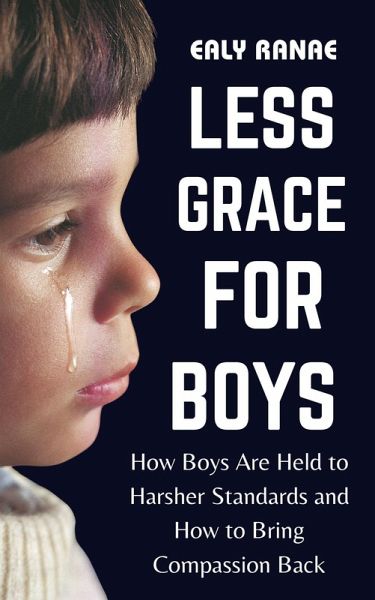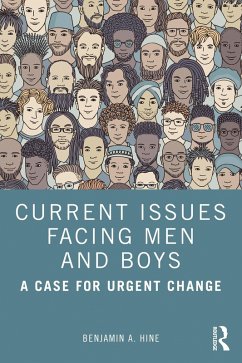
Less Grace for Boys : How Boys Are Held to Harsher Standards and How to Bring Compassion Back (eBook, ePUB)

PAYBACK Punkte
0 °P sammeln!
"Less Grace for Boys" explores the unspoken reality that boys are often held to harsher standards, expected to suppress emotion, mature faster, and prove resilience in ways that deny them the space to be vulnerable. The book unravels how cultural norms, educational systems, and family dynamics create a landscape where compassion for boys is often in short supply, and the consequences echo throughout their development and into adulthood.The narrative examines how expectations placed on boys differ sharply from those placed on girls, often demanding toughness and independence before they are equ...
"Less Grace for Boys" explores the unspoken reality that boys are often held to harsher standards, expected to suppress emotion, mature faster, and prove resilience in ways that deny them the space to be vulnerable. The book unravels how cultural norms, educational systems, and family dynamics create a landscape where compassion for boys is often in short supply, and the consequences echo throughout their development and into adulthood.
The narrative examines how expectations placed on boys differ sharply from those placed on girls, often demanding toughness and independence before they are equipped to handle such pressures. Readers are shown how these expectations impact boys' emotional growth, shaping their ability to communicate, process failure, and form healthy identities. By laying out these patterns clearly, the book reveals why boys struggle silently, often misunderstood or dismissed when they express difficulty.
Attention is given to the environments where boys spend most of their timehomes, schools, and peer groups. Within these spaces, the book illustrates how discipline, grading, and behavioral standards frequently treat mistakes as character flaws rather than learning opportunities. The cumulative effect is that boys grow up believing their worth is tied to performance, compliance, and endurance rather than to their humanity.
The psychological costs are explored in depth. Anxiety, anger, and withdrawal often mask deeper struggles for acceptance and understanding. By ignoring or punishing these signals, society pushes boys toward isolation, reinforcing the cycle of emotional detachment. The book highlights the urgent need to reframe how we view boys' behavior, moving from judgment toward interpretation, and from correction toward guidance.
"Less Grace for Boys" also examines the generational patterns that sustain these standards. Many fathers, teachers, and mentors pass down the same strict expectations they endured, believing it builds strength. The book questions this cycle, showing how strength without compassion becomes brittle and often destructive. Examples are drawn from lived experiences and studies that show how greater empathy fosters resilience, healthier relationships, and more authentic confidence in boys.
Practical strategies for bringing compassion back into the way we raise, teach, and interact with boys are integrated throughout. From listening techniques that validate feelings to disciplinary approaches that teach rather than shame, the book offers actionable ways to change the culture surrounding boys. It emphasizes how creating room for mistakes, vulnerability, and honest dialogue transforms not only individual boys but also the broader environments they inhabit.
The role of community is addressed, demonstrating how schools, families, and peer groups can either reinforce the harshness or provide the grace boys desperately need. Shifting expectations does not mean lowering standards but redefining them to account for humanity, growth, and individuality. By doing so, boys are given the chance to thrive without carrying the weight of constant judgment.
"Less Grace for Boys" delivers both critique and direction. It challenges the systems that condition boys into silence and hardness, while laying out a vision for raising and supporting them with the same compassion often more readily extended to others. It is a call to reimagine what fairness looks like when shaping the next generation of men.
The narrative examines how expectations placed on boys differ sharply from those placed on girls, often demanding toughness and independence before they are equipped to handle such pressures. Readers are shown how these expectations impact boys' emotional growth, shaping their ability to communicate, process failure, and form healthy identities. By laying out these patterns clearly, the book reveals why boys struggle silently, often misunderstood or dismissed when they express difficulty.
Attention is given to the environments where boys spend most of their timehomes, schools, and peer groups. Within these spaces, the book illustrates how discipline, grading, and behavioral standards frequently treat mistakes as character flaws rather than learning opportunities. The cumulative effect is that boys grow up believing their worth is tied to performance, compliance, and endurance rather than to their humanity.
The psychological costs are explored in depth. Anxiety, anger, and withdrawal often mask deeper struggles for acceptance and understanding. By ignoring or punishing these signals, society pushes boys toward isolation, reinforcing the cycle of emotional detachment. The book highlights the urgent need to reframe how we view boys' behavior, moving from judgment toward interpretation, and from correction toward guidance.
"Less Grace for Boys" also examines the generational patterns that sustain these standards. Many fathers, teachers, and mentors pass down the same strict expectations they endured, believing it builds strength. The book questions this cycle, showing how strength without compassion becomes brittle and often destructive. Examples are drawn from lived experiences and studies that show how greater empathy fosters resilience, healthier relationships, and more authentic confidence in boys.
Practical strategies for bringing compassion back into the way we raise, teach, and interact with boys are integrated throughout. From listening techniques that validate feelings to disciplinary approaches that teach rather than shame, the book offers actionable ways to change the culture surrounding boys. It emphasizes how creating room for mistakes, vulnerability, and honest dialogue transforms not only individual boys but also the broader environments they inhabit.
The role of community is addressed, demonstrating how schools, families, and peer groups can either reinforce the harshness or provide the grace boys desperately need. Shifting expectations does not mean lowering standards but redefining them to account for humanity, growth, and individuality. By doing so, boys are given the chance to thrive without carrying the weight of constant judgment.
"Less Grace for Boys" delivers both critique and direction. It challenges the systems that condition boys into silence and hardness, while laying out a vision for raising and supporting them with the same compassion often more readily extended to others. It is a call to reimagine what fairness looks like when shaping the next generation of men.
Dieser Download kann aus rechtlichen Gründen nur mit Rechnungsadresse in A, B, CY, CZ, D, DK, EW, E, FIN, F, GR, H, IRL, I, LT, L, LR, M, NL, PL, P, R, S, SLO, SK ausgeliefert werden.













